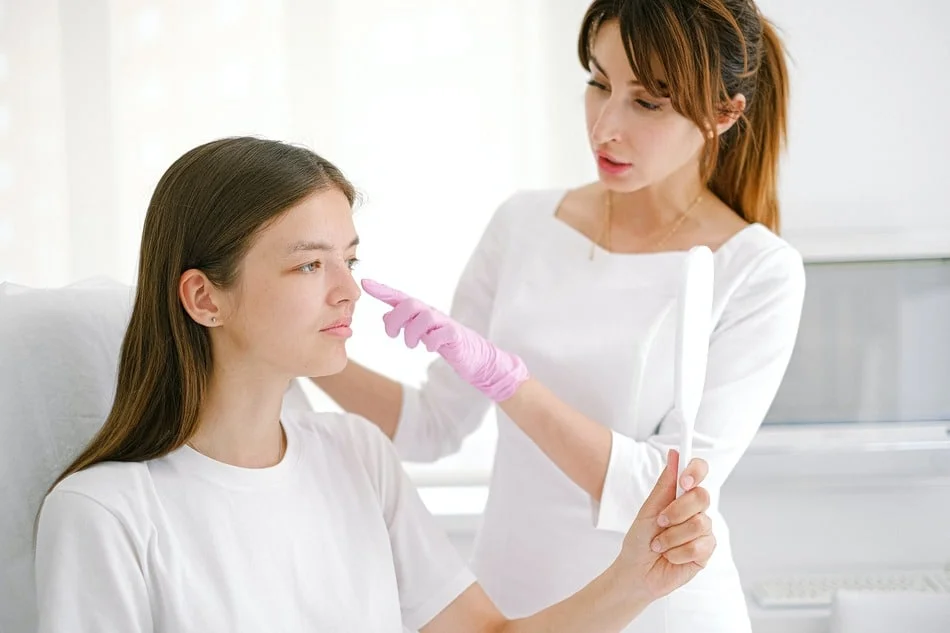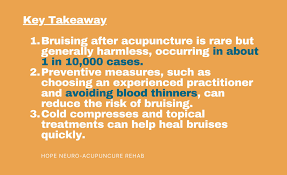
Acupuncture is widely accepted as a key element of traditional Chinese medicine. It has been used for centuries to treat many different health conditions ranging from chronic pain relief all the way up to anxiety reduction. Like all medical treatments though, there are potential side effects and risks associated with acupuncture if not done correctly by an adequately trained professional. In this post, we will be answering some frequently asked questions about what those may be and how you can ensure your safety while having a positive experience.
What Are the Common Side Effects of Acupuncture?
The most common side effects after acupuncture are minor bruises, slight bleeding at needle sites, and temporary tenderness. These symptoms are usually mild and short-lived.
It is normal to have some slight side effects after acupuncture. You may see some small bruises or tiny bleeds where the needles were put in. Some people also feel sore or tender for a while afterward. This is all quite mild and should go away within a day or two at most. It is what the body does when it gets treated like this, so it does not usually cause much trouble.
Are There Any Risks Associated with Acupuncture?
Risks related to infection, nerve damage, or punctured organs due to incorrect needle insertion are very rare as long as qualified practitioners perform them.
Generally, acupuncture is thought to be safe if done by an authorized specialist but like any medical treatment; there can be hazards involved if things go wrong during the process. Infections could occur whereas nerves might get damaged; even organs can be accidentally perforated through improper needling though such severe complications rarely happen. To minimize these risks ensure that sterility is maintained by using clean needles plus verifying your acupuncturist’s credentials before starting any sessions
Who Should Avoid Acupuncture?
People who have bleeding disorders or are taking blood thinners and pregnant women (without medical guidance) should avoid acupuncture or seek advice from a specialist prior to treatment.
Although it is considered safe for the majority, there are certain people who need to be careful when opting for this procedure. For instance, if you suffer from any bleeding disorder or take medication that thins your blood; chances of bleeding and bruising after an acupuncture session might increase. Pregnant ladies should only get treated with acupuncture under the supervision of their doctor because some points on the body can lead to uterine contractions. It is important to always talk with a healthcare provider before commencing any form of therapy if one has other health issues or fears.
What Precautions Should I Take Before Starting Acupuncture?
Make sure you see an authorized acupuncturist who knows what they’re doing. Share your medical history, ongoing therapies, and drugs with the therapist prior to beginning the sessions.
There are a few things you need to know before starting treatment. First of all, ensure that the acupuncturist is licensed so as not to run into problems later. Additionally provide them with information about previous treatments that may still be continuing and any medications being taken currently, sharing these details will help in personalizing treatment according to individual needs besides preventing complications.
How Can I Minimize the Risks of Acupuncture?

To minimize the risks, select an acupuncturist who is certified and trusted, follow pre- and post-treatment instructions for care, and share any worries or conditions.
The best way to minimize risk while using acupuncture is by finding a qualified practitioner. Seek certifications from well-known boards of acupuncture and go through reviews or ask for recommendations from people you trust. Before and after each session, adhere to the care instructions given by your acupuncturist such as avoiding certain foods or drinks and strenuous activities. Additionally, it would be helpful if you are open with your acupuncturist about any concerns that you may have or any condition that you may be suffering from.
Are There Any Risks or Side Effects Associated with Acupuncture?
In addition to minor side effects like soreness or bruising which occurs commonly; infection, nerve damage or punctured organs are among rare risks particularly when it is performed by unqualified practitioners.
While acupuncture is generally considered safe there are some serious complications that one should be aware of even though they occur rarely. Infections can happen when needles are not sterilized properly; moreover, wrong needle placement may result in nerve damage as well as puncturing organs. Therefore, these hazards underline why individuals should choose only qualified acupuncturists who observe high levels of hygiene and safety standards.
What Are Common Reactions to Acupuncture Treatment?
Commonly after acupuncture treatment, most people feel relaxed, tired, or even dizzy. These are just natural responses to the adjustments that are happening in their bodies as a result of each session.
After an acupuncture session, many individuals experience relaxation — some to the point of sleepiness. This is normal, and it happens because your qi (energy) gets used to the therapy. People can also have mild fatigue or lightheadedness especially if they are having their first-ever session among other factors. These normally last for short periods and taking a rest coupled with water intake will help you feel better within no time.
What Are Some Less Observed Adverse Reactions of Acupuncture?
Dizziness, nausea, and fainting are some of the less observed adverse reactions to acupuncture. However, these only happen in very few cases when people who have needle sensitivity or anxiety issues get treated using needles.
Sometimes though not common at all but still possible for someone undergoing this type of treatment may face dizziness, fainting spells or even throw up due to sickness feeling. If any person comes across these signs then he/she should let his/her practitioner know immediately so that necessary adjustments can be made either through altering methods used during therapy sessions or providing additional assistance aimed at ensuring ease throughout such periods.
What Are Some Serious Rare Side Effects?
Serious rare side effects include infections, damaged nerves, or punctured organs which can happen when acupuncture is done wrong or non-sterile needles are used.
Serious complications arising from incorrect practice represent an extraordinarily small proportion of all cases where it is performed. Infections may occur due to the utilization of unsterile needles; also, misplacement of these implements can result in nerve injury and even perforation into inner body parts. These grave events therefore highlight that one must only seek help from licensed acupuncturists who observe safety measures strictly during their work.
How To Minimize Acupuncture Side Effects?
To reduce post-treatment problems select a well-known acupuncturist to communicate about your health status openly with him/her and follow instructions for care after treatment which consists of hydration and resting mostly.
The most important way to minimize any adverse effects associated with this procedure is to find an internationally recognized specialist in acupuncture. Ensure you tell them everything regarding your current medical condition among other things so that they may modify their approach accordingly based on those factors. Additionally following recommendations given on what should be done after receiving therapy like drinking enough fluids while taking enough rest will go a long way in preventing such complications from occurring again
What Should You Avoid After Acupuncture?
After acupuncture, avoid energetic activities, alcohol, coffee, and heavy meals so that your body can rest and process the treatment properly.
Post-acupuncture care is important for getting the most out of the treatment and preventing problems. It is suggested that you do not engage in strenuous activities because your body needs time to rest and recuperate. Alcohol and caffeine should be avoided as they can disrupt the natural healing processes of your body. Additionally, heavy meals may burden your digestive system so opt for lighter well-balanced meals after your session.
What Not to Do After Acupuncture?
To maintain the calming and balancing effects of the treatment, don’t overdo it physically or mentally with stressful situations or electronics after acupuncture.
In order to maintain calmness and balance achieved through acupuncture certain things have to be avoided which could lead to over-stimulation of the body-mind complex. Doing too much physical exercise, exposing oneself to stressful situations, or keeping close contact with electronic gadgets may work against the benefits gained from this method. Let relaxation set in while allowing gentle activities to take place thereby enabling full integration of healing brought about by this technique throughout one’s entire being.
Why Should You Avoid Caffeine After Acupuncture?

Yes you should, it is better to abstain from caffeine after undergoing acupuncture treatment.
The reason why caffeine should be avoided following an acupuncture session is because of its stimulating nature. When the body is relaxed as it would be after a therapy session and then introduced to caffeine, occurs imbalance which results in anxiety or restlessness. To ensure that the therapeutic effects of acupuncture are maintained, one must not consume any caffeinated products at least for several hours post-treatment.
Is It Necessary to Avoid Alcohol After Acupuncture?
Yes, drinking alcohol can slow down the healing process of your body and nullify the effects of acupuncture. Therefore, it is recommended to abstain from alcohol after receiving treatment.
After undergoing acupuncture, it is best to refrain from consuming alcohol because this substance has a negative impact on recovery and recuperation within an individual’s physique. The reason behind this is that liquor interferes with energy equilibrium as well as detoxification which are stimulated by such therapies. So by staying away from alcoholic drinks during this period, you give your system maximum chance of benefiting from all angles through these sessions while also promoting general health.
Can Exercise Impact Acupuncture Results?
Yes, doing too much exercise can upset the energy balance achieved by acupuncture and therefore it is best to do light activities after treatment.
However, intense physical activity should be avoided after getting acupuncture. This is because such exercises disrupt the energy equilibrium that had been set up during the session hence causing tiredness or even discomfort. Rather than working too hard and overexerting oneself, gentle actions that encourage blood flow without straining the body are recommended in order to sustain the outcomes of this therapy.
Are There Other Common Side Effects of Acupuncture?
Additional typical symptoms may include fatigue, slight dizziness, or emotional release – all of which tend to be mild and temporary.
Some people may experience tiredness or faintness following acupuncture as well as physical side effects such as bruises and soreness. Emotional release is another ordinary reaction since emotions stored in our bodies can be released through needling during treatment sessions; most of these reactions are usually not severe lasting only for a few days while the patient adapts to new changes brought about by this form of therapy.
Conclusion: Ensuring a Safe and Effective Acupuncture Experience
To ensure a secure and successful treatment, it is important to know that acupuncture has many advantageous health impacts while being aware of its possible side effects and risks. Such as picking an eligible acupuncturist or practitioner, telling them everything about your medical history truthfully, and obeying the instructions given after the procedure will help to reduce any possible harm brought by this technique. Given that you do follow these necessary steps along with having a positive attitude towards it; then acupuncture can become another tool in your quest for better health by bringing harmony into your life which leads to healing at large.
